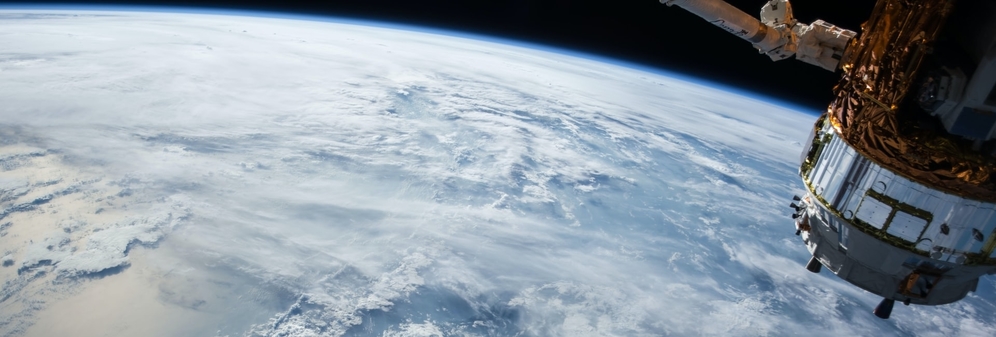Space is a key sector for growth in the UK creating new opportunities across digital applications, engineering, and environmental protection.
The University of Bristol has a strong space research landscape, with upstream and downstream research capabilities in areas such as materials for space; earth observation; space systems, robotics and components; and secure communications.
Join us at our Space Research Showcase to find out more. Meet our inspirational researchers and other industry stakeholders working in this area, and explore opportunities for developing collaborations and partnerships.
Exhibitors
Materials for Space
Professor Ian Hamerton
New polymers and composites with greater longevity for space applications
Dr Rainer Groh and Dr Alberto Pirrera
iCOMAT - Fibre steering for lightweight and cost-efficient space structures
Earth Observation
Professor Alin Achim
Earth observation for maritime monitoring and sea surface modelling
Mark Bemelmans
CEOS Volcano Demonstrator project
Professor Juliet Biggs
Centre for Observation and Modelling of Earthquakes, Volcanoes and Tectonics (COMET)
Dr Odysseas Pappas
ESA's Harmony Mission (specifically the Solid Earth Component)
Professor Matthew Rigby
Research uses observations from satellites and ground-based instruments to estimate greenhouse gas fluxes. They have previously published estimates of methane emissions from Brazil, India, China and other major emitting regions.
Dr Rafael Rosolem and Dr Miguel Rico-Ramirez
Applications involving cosmic-ray neutron sensing technology for hydrology and agriculture, with potential benefits for space weather.
Space systems, robotics and components
Professor Lucy Berthoud
Research includes microsatellites, interplanetary spacecraft design, Mars sample return missions, planetary protection, active debris removal, Model-Based Systems Engineering.
Professor Neil Fox
ESA Ideas project - Radio Voltaic Identification Beacon
Professor Katharine Robson Brown
BioMoon project
Professor Tom Scott
Gamma voltaic power systems for space applications
Professor Anastasios Sextos
The UKCRIC Soil-Foundation-Structure Interaction Laboratory
Dr Antonia Tzemanaki and Joe Louca
Remote operation of robots in space introduces unavoidable signal delays due to the large distances involved. This has implications for applications such as in-orbit servicing of satellites or construction of infrastructure on lunar surface. This research explores how this delay affects performance, workload and trust when operating a robot arm for maintenance tasks, and the inclusion of force feedback in these systems.
Secure Communications
Dr Sridhar Adepu
Security of Cyber-Physical Systems (CPS), Industrial Control Systems and Critical National Infrastructure. Research investigates the cyber-physical attack models, impact of attacks, detection and mitigation on CPS, taking a multidisciplinary approach to tackle the security issues associated with CPS and applying cyber security, formal methods, and machine learning fundamentals for advancing CPS security.
Dr Joseph Hallett
Research explores how we can build security into operating systems and programming languages in a way that helps developers get it right and create secure software without making too many mistakes. They have been working on achieving greater awareness and sociotechnical understanding of the human barriers that stand in the way of next generation digital security success, to transform policy making, accelerate adoption and drive consistent use.
Dr Timothy Pelham
A passive radar satellite network, leveraging the wealth of satellite emitters in X, Ku, and Ka band to sense the earth in a flexible way.
Professor John Rarity and Dr Siddarth Joshi
Satellite-based Quantum Key Distribution (QKD). QKD is limited by transmission loss. With industrial partners Craft Prospect and academic collaborators in University of Strathclyde, a commercially viable 6U QKD satellite based on polarisation encoded Decoy State Protocol is being built. Components crafted as part of this collaboration will be exhibited.
As part of the Quantum Communication Hub, an improved prototype of a quantum transmitter is being developed which will be one of two quantum systems tested in the QuaRC mission. To complement ongoing satellite efforts, a low-cost mobile optical ground station (OGS) is being developed, compatible with several international quantum communication satellite efforts. The mobile OGS will be used to identify sites suitable for linking satellites into the UK wide quantum network which is under construction.
Professor Dimitra Simeonidou, Dr Hamid Falaki, Alex Mavromatis, Antonis Vafeas
ORANOS project - developing satellite backhaul to 5G mobile networks and related technologies.
Location
Bill Brown Design Suite
Queen's Building
(Woodland Road entrance)
University of Bristol
BS8 1TR
Schedule
1 pm to 1.45 pm
Lunch and networking
1.45 pm to 4.30 pm
Welcome and introduction: Professor Katharine Robson Brown
Interactive Research Exhibition
3 pm
Three-minute thesis presentations
4.30 pm to 5.30 pm
Networking drinks reception
 Three-minute thesis presentations - 3 pm
Three-minute thesis presentations - 3 pm
PhD students give an engaging and accessible summary of their current space research projects in just three minutes.
- Reece Lincoln - Fibre Steering for Lightweight and Cost-efficient Space Structures
- Mayra Rivera Lopez - Exploring space with novel composite materials
- Mark Bemelmans - It's all in the details: Volcano monitoring with high-resolution SAR data
- Ziyao Zhang - SAR Imaging and Autofocusing using Machine Learning
- Joe Louca - Trustworthy remote robotic manipulation with signal delays for Earth-to-orbit and Earth-to-Moon applications
- Louis Timperley – The use of MBSE in spacecraft projects
- Gary Sutlieff – Chemical Biological Nuclear Threat detection from space
- Oliver Pike – Space security planning
- Tom Etchells – Volcanic ash detection from space
- Elliott Hastings – Space: The Key to Quantum
- Peide Zhang - Timing and Synchronisation in Space Quantum
